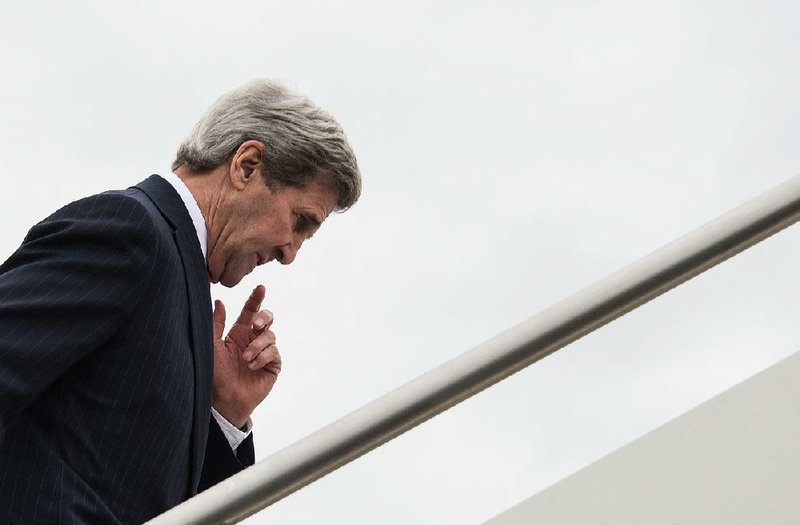GENEVA -- The United Nations envoy for Syria announced Wednesday a "temporary pause" in peace talks in Geneva just two days after they officially began, saying the process will resume later this month.
Speaking to reporters after a meeting with opposition leaders, Staffan de Mistura said, "This is not the end, and it is not the failure of the talks."
De Mistura said both sides were "interested in having the political process started" and that he had set a new date of Feb. 25 for the resumption of the talks.
"I'm not frustrated; I'm not disappointed," de Mistura said. "You have to be determined and realistic."
"I'm not prepared to have talks for the sake of talks," he added.
The announcement comes just two days after de Mistura opened the first talks in two years aimed at ending a five-year war that has killed more than 250,000 people and displaced an estimated 11 million people.
Syrian forces, backed by Russian airstrikes, have advanced in northern Syria in recent days, leading the opposition to accuse Damascus of negotiating in bad faith.
On Wednesday, troops blasted their way into two Shiite villages in northern Syria, breaking a long-running rebel siege, Syrian TV reported.
The two villages, Nubl and Zahra, are in the middle of opposition territory. They have been blockaded by rebel groups for about three years, with the army occasionally airdropping food and other aid.
Their capture would mark a major victory for government forces, which have made significant advances in Aleppo province in the past few days, severing a key supply route linking rebels in Aleppo city to the Turkish border.
Pro-government forces are waging a major offensive north of Aleppo to besiege rebel-held neighborhoods. If it succeeds, it will be one of the biggest blows to the insurgents since they captured large parts of the city, Syria's largest, in the summer of 2012.
In a statement issued Wednesday from London, U.S. Secretary of State John Kerry called on Syrian President Bashar Assad's government to cease the bombing of rebel forces. He said it was "past time for them to meet existing obligations and restore the international community's confidence in their intentions of supporting a peaceful resolution."
De Mistura said both sides had expressed concerns about the talks, with the government wanting to address "procedural issues before talking about [the] humanitarian side."
But he said "the U.N. cannot allow simply procedural matters to actually become more important than actually the result for the humanitarian situation for the Syrian people, who have been waiting for us to deliver not a conference but something concrete for them."
He said he would not directly address Wednesday's developments but that "military activities and other reasons" had made it impossible to make headway on humanitarian issues like the lifting of sieges on many Syrian cities, towns and villages or the granting of access to "unreachable" parts of the country.
For the opposition, the Aleppo advances cast a long shadow over the talks.
Bassma Kodmani, a member of the opposition's negotiating team, described the offensive as a "horrible development," saying it sends the message that "there is nothing to negotiate. Just go home."
The opposition bloc, known as the Higher Negotiations Committee and backed by Saudi Arabia, said on Twitter that it would not return to Geneva "until it sees progress on the ground" in Syria.
In a news conference, the committee's leader, Riad Hijab, blamed the government for the suspension. "The regime is trying to buy time without doing anything," Hijab said.
Syrian TV said the siege of Nubl and Zahra was broken by the army and Shiite militias known as the Popular Defense Committees. The Hezbollah-owned Al-Manar TV also reported the advance and showed exclusive footage of the fighting on the outskirts of the villages.
The Britain-based Syrian Observatory for Human Rights, an opposition group that monitors the conflict through activists inside the country, said the Syrian army was 1 mile away from the two villages.
Meanwhile, an aid convoy headed to a besieged rebel-held town near Damascus, but Syria's opposition said that such deliveries are meaningless given the situation in Aleppo.
The convoy heading to Moadamiyeh is the second aid delivery to rebel-held areas near the capital in as many days, a spokesman for the International Committee of the Red Cross said. Pawel Krzysiek said that 12 trucks carrying food, medicine and medical equipment were expected to arrive later in the day.
By late afternoon, Krzysiek said the convoy is "about to enter." He posted a photograph on his Twitter account showing hundreds of people gathered at a distance waiting for the supplies to reach them.
The humanitarian situation in the town worsened toward the end of last year after the government choked off the last access point. Opposition activists and residents said there are dozens of cases of severe malnutrition in Moadamiyeh.
Kodmani called the latest aid delivery a "positive development" but said "it is way below what we are hoping to see happen."
Information for this article was contributed by Nick Cumming-Bruce of The New York Times.
A Section on 02/04/2016

